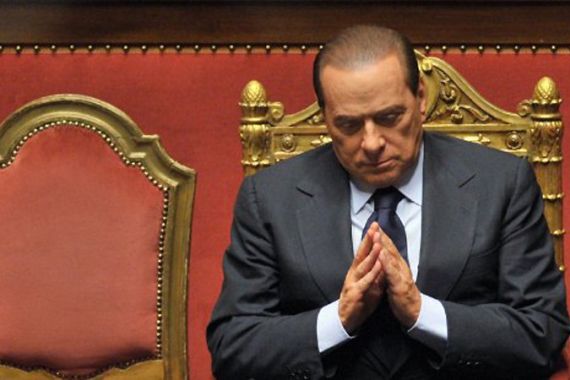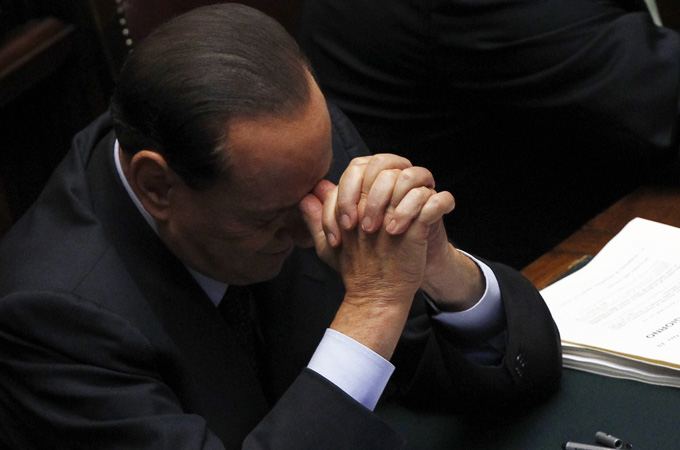Italy’s lower house debates austerity plan
Prime Minister Silvio Berlusconi is expected to resign after the Italian chamber of deputies adopts reform measures.

 |
| Berlusconi has said he will resign after the austerity package’s adoption, and not stand in new elections [Reuters] |
The Italian chamber of deputies, or lower house, is meeting in a special session to ratify an austerity package which, if adopted, could trigger the resignation of Silvio Berlusconi, the Italian prime minister.
The Italian senate has already passed the measures by an overwhelming majority, which are designed to avoid a bailout of the eurozone’s third largest economy.
The upper house of parliament voted 156-12 on Friday to pass the country’s budget bill, which included the reform measures. The law is due to be approved by the lower house on Saturday.
Berlusconi has said he will step down once the austerity measures are adopted. However, he is expected to hold one last cabinet meeting, before officially handing in his resignation to the president.
There are mounting indications that economist Mario Monti will then be chosen to head a transitional government to push through even more difficult reforms.
Greek-style crisis
Italy is facing a Greek-style economic crisis that many fear would threaten the existence of the entire eurozone and cause a global recession.
Paving the way for Monti’s appointment, Giorgio Napolitano, Italy’s president, made him a senator-for-life on Wednesday, in a surprise move that raised his already high profile and instantly made him a legislator.
|
Mario Monti’s potential role as Italy’s leader
|
That would mean Napolitano may accept Berlusconi’s resignation as early as Saturday night, and formally mandate Monti to try to form a new government soon afterwards.
Napolitano has urged parliament to act fast, and some analysts say a new government, made up mostly of technocrats, could be in place as early as Sunday night before markets open on Monday.
Napolitano moved quickly to calm markets on Wednesday after Italy’s borrowing costs reached levels that could close its access to market funding, a development which would threaten the future of the eurozone.
He gave assurances that Berlusconi would honour his pledge to step down after parliament approved reforms geared to placate markets, and he would waste no time in either appointing a new government or calling new elections.
Austerity plan
At first, Berlusconi had insisted that early elections were the only option. But he has since softened his stand and is said by sources to be open to a new government.
Monti has been pushed by markets for weeks as the most suitable figure to lead a national unity government to urgently push through further austerity measures.
On Saturday morning, Monti met with the new head of the European Central Bank, Mario Draghi, and leaders of the
centre-left opposition before holding a working lunch with Berlusconi.
| Italian citizens are bracing themselves as spending cuts appear increasingly inevitable [Al Jazeera] |
Napolitano met Monti on Thursday night, and, in a sign of the urgency of the situation, spoke by telephone with Barack Obama, the US president.
In one successful move that calmed markets somewhat, Italy managed to sell $6.8bn of one-year bonds on Thursday, but had to pay a steep 6.087 per cent interest rate, the highest in 14 years.
It was not clear how much of Berlusconi’s ruling PDL party, which has undergone many defections and splits in the past few days, would support the new government, expected to include respected experts as well as a few politicians.
It will be supported by most centrists and the biggest opposition force, the Democratic Party.
Berlusconi’s chief coalition partner, the Northern League, has said it would not back Monti.
Monti, who is currently head of Milan’s prestigious Bocconi university, is considered a tough negotiator with a record of taking on powerful corporate interests as European Competition Commissioner.